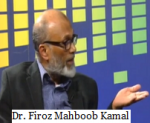MUHAMMAD TARIQ GHAZI
THIS is my house. I would often say this to visitors about a property that did not belong to me. I was always a tenant. The plot of land and the house belonged to someone else. Then when I was able to purchase a house, I still said to my acquaintances that “this is my house, even though later someone else purchased it when I moved to another town.
Who is the owner of that house, then?
Fifty years ago the plot on which I had my house belonged to someone other than the man who sold it to me. I know a family who is living in a house for the last four generations, but I know that before that the same land was owned by someone not from that family.
“This is my country.†I told a foreigner. The country that I called mine had a totally different political geography one hundred years ago. Five hundred years ago my ancestors had moved to that country from some other country which my family does not consider our country now. That country also considers our family as aliens, just like I am a stranger in the house where I used to live 20 or 30 years ago.
What does all this suggest?
Yes. I do not own anything on this Earth. Nobody else does, for that matter. In fact, “to Allah belongs the heritage of the heavens and the Earthâ€. (The Qur’an Aal Imran 3:180; A’raf 7:128; Al-Hadid 57:10; Maryam 19:40)
More or less 1,400 years ago Second Caliph Hazrat Umar r realized this legal fact as a result of almost a month of heated debates in a Shura assembly that was sharply divided over the issue of land. After the recapture of Iraq from the Persians, Islamic military demanded that the conquered land should be distributed among the troops as fiefs and its people enslaved. By that principle every Muslim soldier would get three slaves (Shibli Nomani, Al-Faruq 206 / Naaz Publishing House Delhi). Hazrat Umar was initially reluctant and later was convinced that the land could not be distributed as part of booty. However, in Shura Hazrat Bilal r Ibn Rabah and Hazrat Abd Ar-Rahman r Ibn Awf favored distribution while Hazrat Uthman r, Hazrat Ali r and Hazrat Talhah r sided with Hazrat Umar r. At that point the will of the majority was not imposed.
An expanded Shura was convened with all senior Muhajirin and Ansar in addition to five delegates each from the Aws and Khazraj tribes of the Ansar. In that Shura, majority went to the side of the military. During the inconclusive discussions, Hazrat Umar r recalled an Ayat of the Qur’an that resolved the knotty issue. (Imam Abu Yusuf – En tr Abid Ahmad Ali, Kitab al-Kharaj 65 / Islamic Book Center Lahore 1979). Hazrat Umar r told the session, “I have found a reason for leaving the land as it is and that I should not distribute it which is a saying of Allah: “(It is) for the poor Emigrants who were expelled from their homes and their properties, seeking a share in the surplus (Ùضل) from Allah and His pleasure and they are supporting Allah and His Messenger. Those are the truthful. And also for those who were already settled in Al-Madinah and adopted the Faith before them. ... And [there is a share for] those who came after them...†(The Qur’an Al-Hashr 59:8-9-10)
As soon as the Amir al-Muminin recited the Ayat, concluding at “and those who came after themâ€, the whole assembly reaffirmed wisdom of the Qur’an and exegetic insight of Hazrat Umar r. The decision was unanimous to retain the conquered land with their erstwhile tillers, who were still non-Muslims, and levy an agricultural tax on them. Hazrat Umar r appointed Hazrat Uthman r Ibn Hunayf, an Ansari expert geographer and agronomist, to measure Iraq’s arable land and decide the rate of tax.
After several months of perseverance that took him to every nook and corner of Iraq, he concluded that cultivable land was 36 million jaribs (square staves or more than 60 billion square metres). He set the rate of revenues such as 10 dirhams per jarib for harvests of grapes, date groves 8 dirhams per jarib, sugarcane 6 dirhams per Jarib, wheat 4 dirhams per Jarib and barley 2 dirhams per jarib. The reform increased Iraq’s annual revenue from 80 million dirhams to 100.2 million dirhams. Hazrat Umar r was worried by the tremendous increase in the revenue and said to Hazrat Uthman r when in 640CE he visited The Madinah if he had imposed a heavier burden of taxes on the public than they could bear. Hazrat Uthman r said, “I have left half the amount to the farmer; you can get that too, if you wishâ€. (Imam Abu Yusuf, Kitab al-Kharaj 66-69)
It was not a temporary arrangement, although the same land of Iraq is no longer owned by those farmers who had been given lien to it by Hazrat Umar r and his Shura. Descendants of those farmers don’t say “that is our landâ€. Shura’s decision based on the Qur’an had far reaching implications.
This law determines it’s other way round. The land does not belong to you, you belong to a land – house or nation. Islam states that love of the land (nation) is part of the Faith.
Hazrat Umar r had in fact derived an economic and sociological law from two phrases of three Ayat of Surah Al-Hashr. A conquered land, especially its cultivable areas, cannot be treated as war booty. Continued cultivation was guaranteed by returning the land to the former owners. In fact yield had increased since the levy was only half of the actual revenue the farmers should be paying. Historically the Iraqis did not follow the Magian religion of their former Persian masters, obviously because the Persian Empire had imposed an oppressive tax regime. Hazrat Uthman r Ibn Hunayf’s policy encouraged almost all of the Iraqis to embrace Islam within no time.
These are moral and economic factors. More importantly, the decision confirmed that only those people exercised temporary right to a piece of land or property who are able to use it for the benefit of society.
The Qur’an decided the law of inheritance in several places. Allah said, “Has it not become clear to those who inherited the earth after its previous people? (The Qur’an Al-A’raf 7:100); that “Indeed, the earth belongs to Allah. He causes to inherit it whom He wills of His servants†(The Qur’an Al-A’raf 7:128); that “He caused you to inherit their land and their homes and their properties and a land which you have not trodden†(The Qur’an Al-Ahzab 33:27). And finally, “indeed, it is We who give life and cause death, and We are the Inheritor†(The Qur’an Al-Hijr 15:23).
In short, life of an individual person or even a nation or civilization, is finite and short, while Earth has existed for eons. The Earth belongs to no man, but to Allah.
Can one count how many owners have changed in Iraq since the men whose property rights were confirmed by Hazrat Umar’s r Shura?
Muhammad Tariq Ghazi is the Director Umam Studies House – USH / Toronto. He can be reached at tariqghazi04@yahoo.ca







